Sociology of Health and Illness: Culture, Beliefs, and Management
VerifiedAdded on 2023/01/12
|7
|1940
|63
Essay
AI Summary
This essay delves into the sociology of health, examining the intricate relationship between culture, health, and illness. It explores how cultural factors shape individual perceptions, beliefs, and behaviors related to health and disease, including the influence of lay beliefs and management strategies. The essay analyzes the application of sociological theories, such as conflict theory and functionalist perspectives, to understand the distribution of healthcare resources and the impact of illness on social order. It further discusses the social determinants of health, the impact of cultural values on patient behavior, and the role of lay management practices, including medical self-care and coping strategies, in managing health and illness within society. The essay concludes by emphasizing the crucial role of culture in shaping health outcomes and the need to consider cultural perspectives in healthcare delivery.
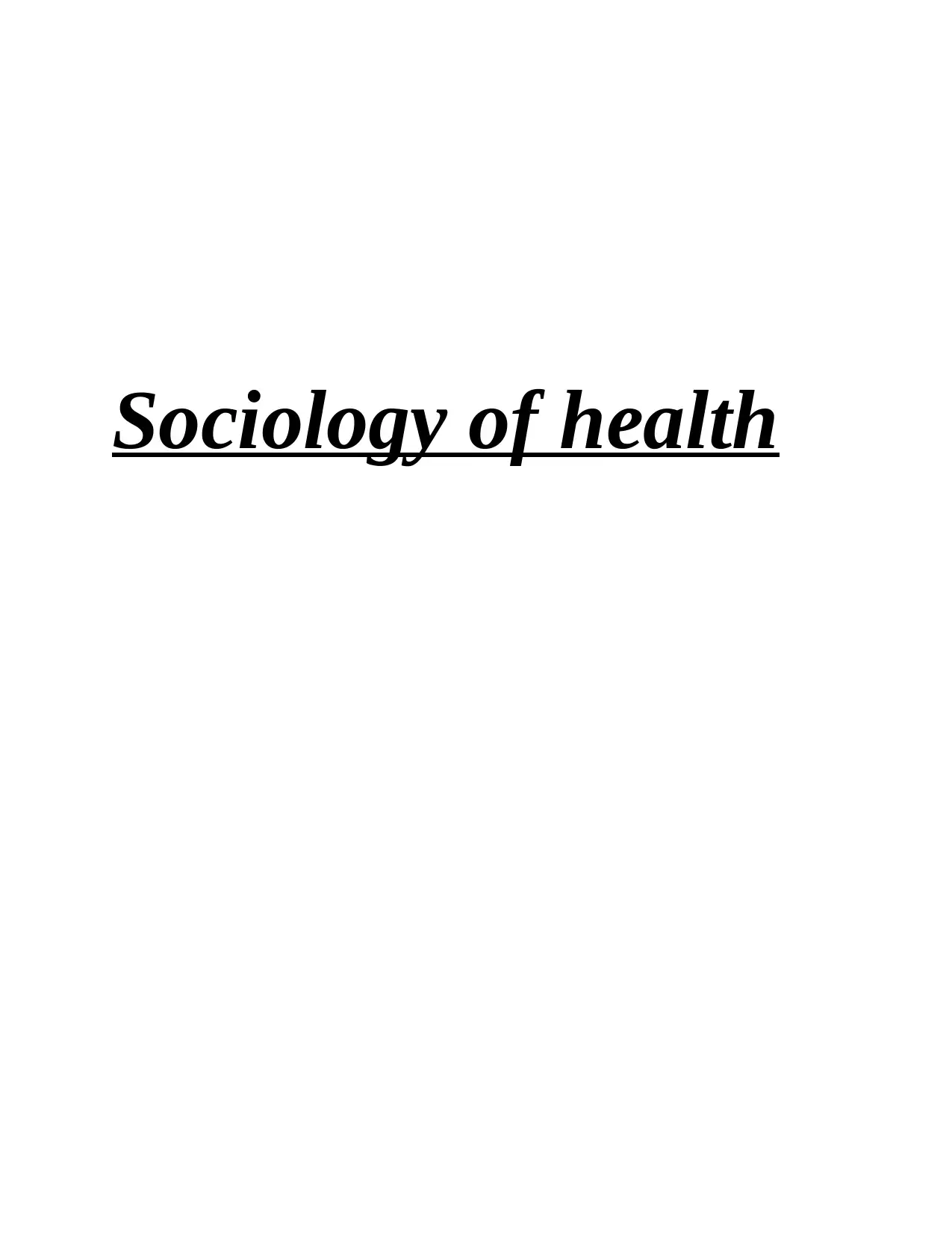
Sociology of health
Paraphrase This Document
Need a fresh take? Get an instant paraphrase of this document with our AI Paraphraser
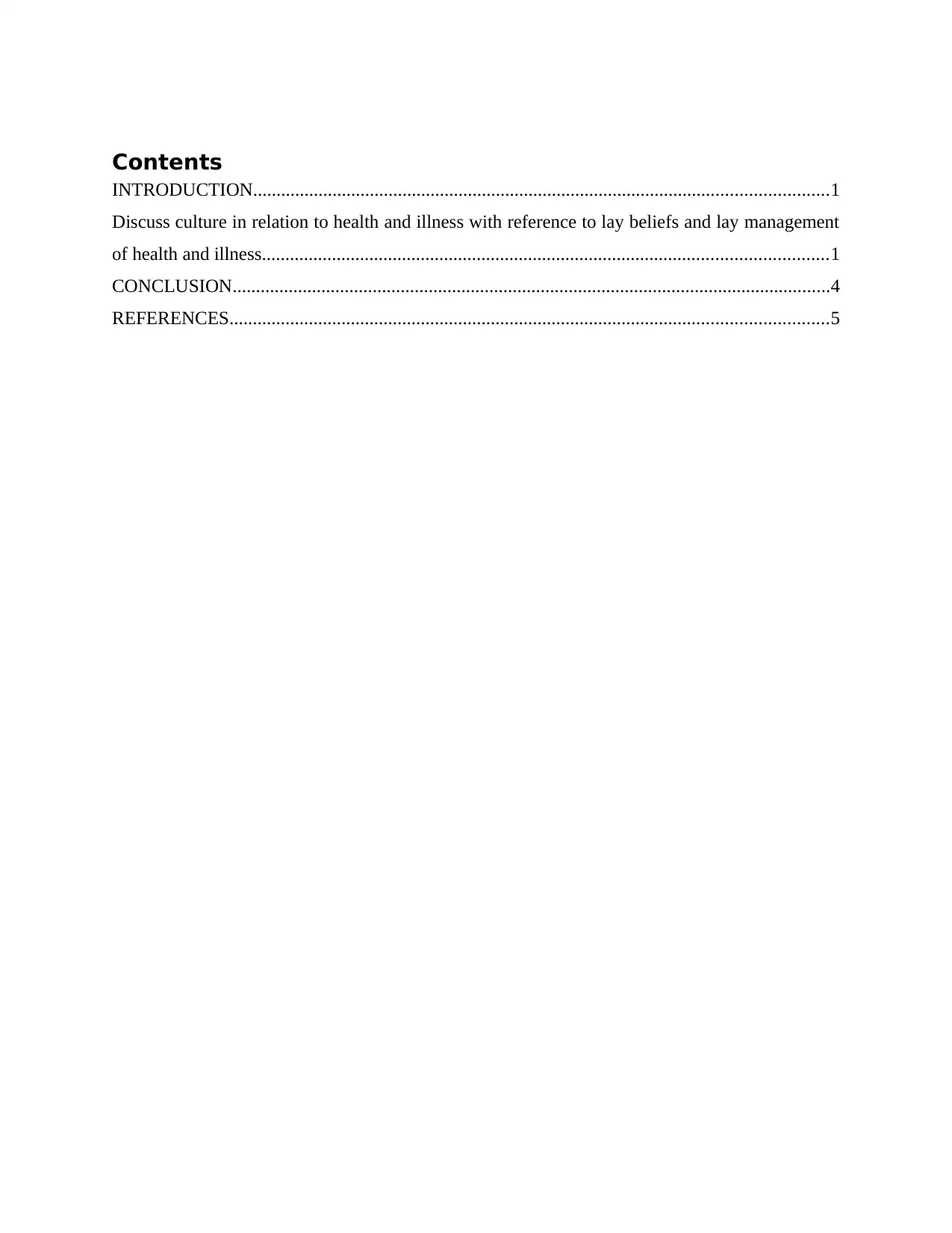
Contents
INTRODUCTION...........................................................................................................................1
Discuss culture in relation to health and illness with reference to lay beliefs and lay management
of health and illness.........................................................................................................................1
CONCLUSION................................................................................................................................4
REFERENCES................................................................................................................................5
INTRODUCTION...........................................................................................................................1
Discuss culture in relation to health and illness with reference to lay beliefs and lay management
of health and illness.........................................................................................................................1
CONCLUSION................................................................................................................................4
REFERENCES................................................................................................................................5
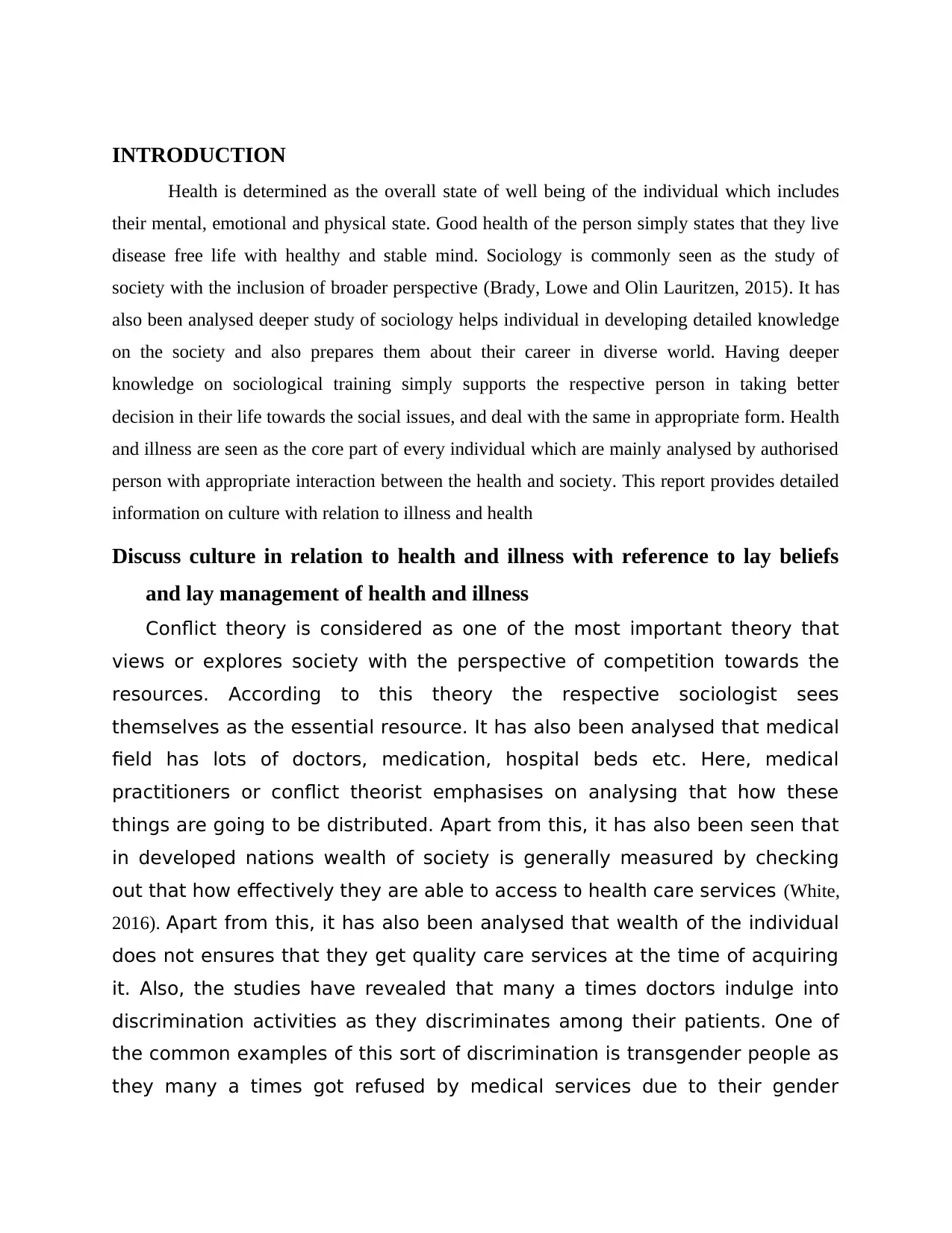
INTRODUCTION
Health is determined as the overall state of well being of the individual which includes
their mental, emotional and physical state. Good health of the person simply states that they live
disease free life with healthy and stable mind. Sociology is commonly seen as the study of
society with the inclusion of broader perspective (Brady, Lowe and Olin Lauritzen, 2015). It has
also been analysed deeper study of sociology helps individual in developing detailed knowledge
on the society and also prepares them about their career in diverse world. Having deeper
knowledge on sociological training simply supports the respective person in taking better
decision in their life towards the social issues, and deal with the same in appropriate form. Health
and illness are seen as the core part of every individual which are mainly analysed by authorised
person with appropriate interaction between the health and society. This report provides detailed
information on culture with relation to illness and health
Discuss culture in relation to health and illness with reference to lay beliefs
and lay management of health and illness
Conflict theory is considered as one of the most important theory that
views or explores society with the perspective of competition towards the
resources. According to this theory the respective sociologist sees
themselves as the essential resource. It has also been analysed that medical
field has lots of doctors, medication, hospital beds etc. Here, medical
practitioners or conflict theorist emphasises on analysing that how these
things are going to be distributed. Apart from this, it has also been seen that
in developed nations wealth of society is generally measured by checking
out that how effectively they are able to access to health care services (White,
2016). Apart from this, it has also been analysed that wealth of the individual
does not ensures that they get quality care services at the time of acquiring
it. Also, the studies have revealed that many a times doctors indulge into
discrimination activities as they discriminates among their patients. One of
the common examples of this sort of discrimination is transgender people as
they many a times got refused by medical services due to their gender
Health is determined as the overall state of well being of the individual which includes
their mental, emotional and physical state. Good health of the person simply states that they live
disease free life with healthy and stable mind. Sociology is commonly seen as the study of
society with the inclusion of broader perspective (Brady, Lowe and Olin Lauritzen, 2015). It has
also been analysed deeper study of sociology helps individual in developing detailed knowledge
on the society and also prepares them about their career in diverse world. Having deeper
knowledge on sociological training simply supports the respective person in taking better
decision in their life towards the social issues, and deal with the same in appropriate form. Health
and illness are seen as the core part of every individual which are mainly analysed by authorised
person with appropriate interaction between the health and society. This report provides detailed
information on culture with relation to illness and health
Discuss culture in relation to health and illness with reference to lay beliefs
and lay management of health and illness
Conflict theory is considered as one of the most important theory that
views or explores society with the perspective of competition towards the
resources. According to this theory the respective sociologist sees
themselves as the essential resource. It has also been analysed that medical
field has lots of doctors, medication, hospital beds etc. Here, medical
practitioners or conflict theorist emphasises on analysing that how these
things are going to be distributed. Apart from this, it has also been seen that
in developed nations wealth of society is generally measured by checking
out that how effectively they are able to access to health care services (White,
2016). Apart from this, it has also been analysed that wealth of the individual
does not ensures that they get quality care services at the time of acquiring
it. Also, the studies have revealed that many a times doctors indulge into
discrimination activities as they discriminates among their patients. One of
the common examples of this sort of discrimination is transgender people as
they many a times got refused by medical services due to their gender
⊘ This is a preview!⊘
Do you want full access?
Subscribe today to unlock all pages.

Trusted by 1+ million students worldwide
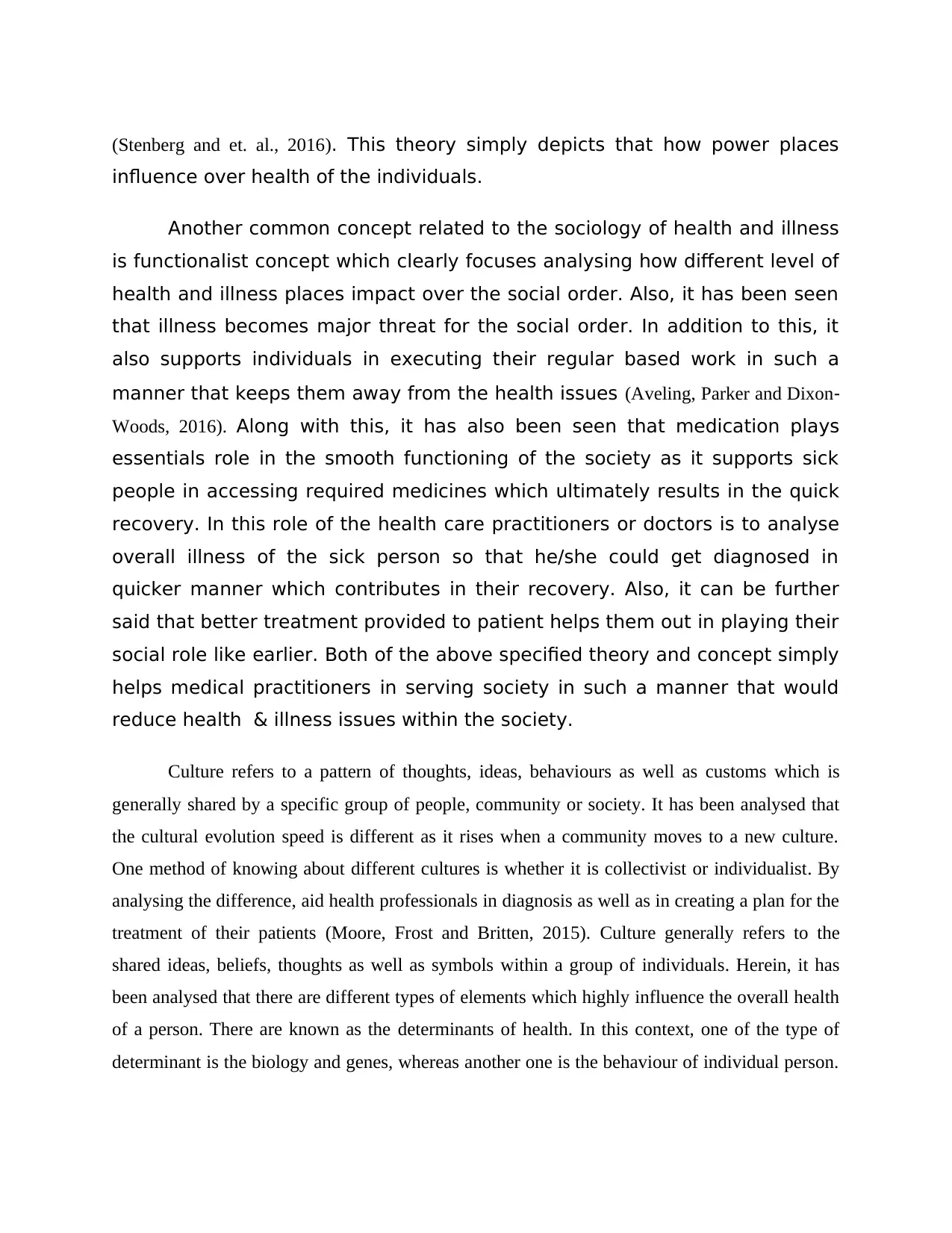
(Stenberg and et. al., 2016). This theory simply depicts that how power places
influence over health of the individuals.
Another common concept related to the sociology of health and illness
is functionalist concept which clearly focuses analysing how different level of
health and illness places impact over the social order. Also, it has been seen
that illness becomes major threat for the social order. In addition to this, it
also supports individuals in executing their regular based work in such a
manner that keeps them away from the health issues (Aveling, Parker and Dixon‐
Woods, 2016). Along with this, it has also been seen that medication plays
essentials role in the smooth functioning of the society as it supports sick
people in accessing required medicines which ultimately results in the quick
recovery. In this role of the health care practitioners or doctors is to analyse
overall illness of the sick person so that he/she could get diagnosed in
quicker manner which contributes in their recovery. Also, it can be further
said that better treatment provided to patient helps them out in playing their
social role like earlier. Both of the above specified theory and concept simply
helps medical practitioners in serving society in such a manner that would
reduce health & illness issues within the society.
Culture refers to a pattern of thoughts, ideas, behaviours as well as customs which is
generally shared by a specific group of people, community or society. It has been analysed that
the cultural evolution speed is different as it rises when a community moves to a new culture.
One method of knowing about different cultures is whether it is collectivist or individualist. By
analysing the difference, aid health professionals in diagnosis as well as in creating a plan for the
treatment of their patients (Moore, Frost and Britten, 2015). Culture generally refers to the
shared ideas, beliefs, thoughts as well as symbols within a group of individuals. Herein, it has
been analysed that there are different types of elements which highly influence the overall health
of a person. There are known as the determinants of health. In this context, one of the type of
determinant is the biology and genes, whereas another one is the behaviour of individual person.
influence over health of the individuals.
Another common concept related to the sociology of health and illness
is functionalist concept which clearly focuses analysing how different level of
health and illness places impact over the social order. Also, it has been seen
that illness becomes major threat for the social order. In addition to this, it
also supports individuals in executing their regular based work in such a
manner that keeps them away from the health issues (Aveling, Parker and Dixon‐
Woods, 2016). Along with this, it has also been seen that medication plays
essentials role in the smooth functioning of the society as it supports sick
people in accessing required medicines which ultimately results in the quick
recovery. In this role of the health care practitioners or doctors is to analyse
overall illness of the sick person so that he/she could get diagnosed in
quicker manner which contributes in their recovery. Also, it can be further
said that better treatment provided to patient helps them out in playing their
social role like earlier. Both of the above specified theory and concept simply
helps medical practitioners in serving society in such a manner that would
reduce health & illness issues within the society.
Culture refers to a pattern of thoughts, ideas, behaviours as well as customs which is
generally shared by a specific group of people, community or society. It has been analysed that
the cultural evolution speed is different as it rises when a community moves to a new culture.
One method of knowing about different cultures is whether it is collectivist or individualist. By
analysing the difference, aid health professionals in diagnosis as well as in creating a plan for the
treatment of their patients (Moore, Frost and Britten, 2015). Culture generally refers to the
shared ideas, beliefs, thoughts as well as symbols within a group of individuals. Herein, it has
been analysed that there are different types of elements which highly influence the overall health
of a person. There are known as the determinants of health. In this context, one of the type of
determinant is the biology and genes, whereas another one is the behaviour of individual person.
Paraphrase This Document
Need a fresh take? Get an instant paraphrase of this document with our AI Paraphraser
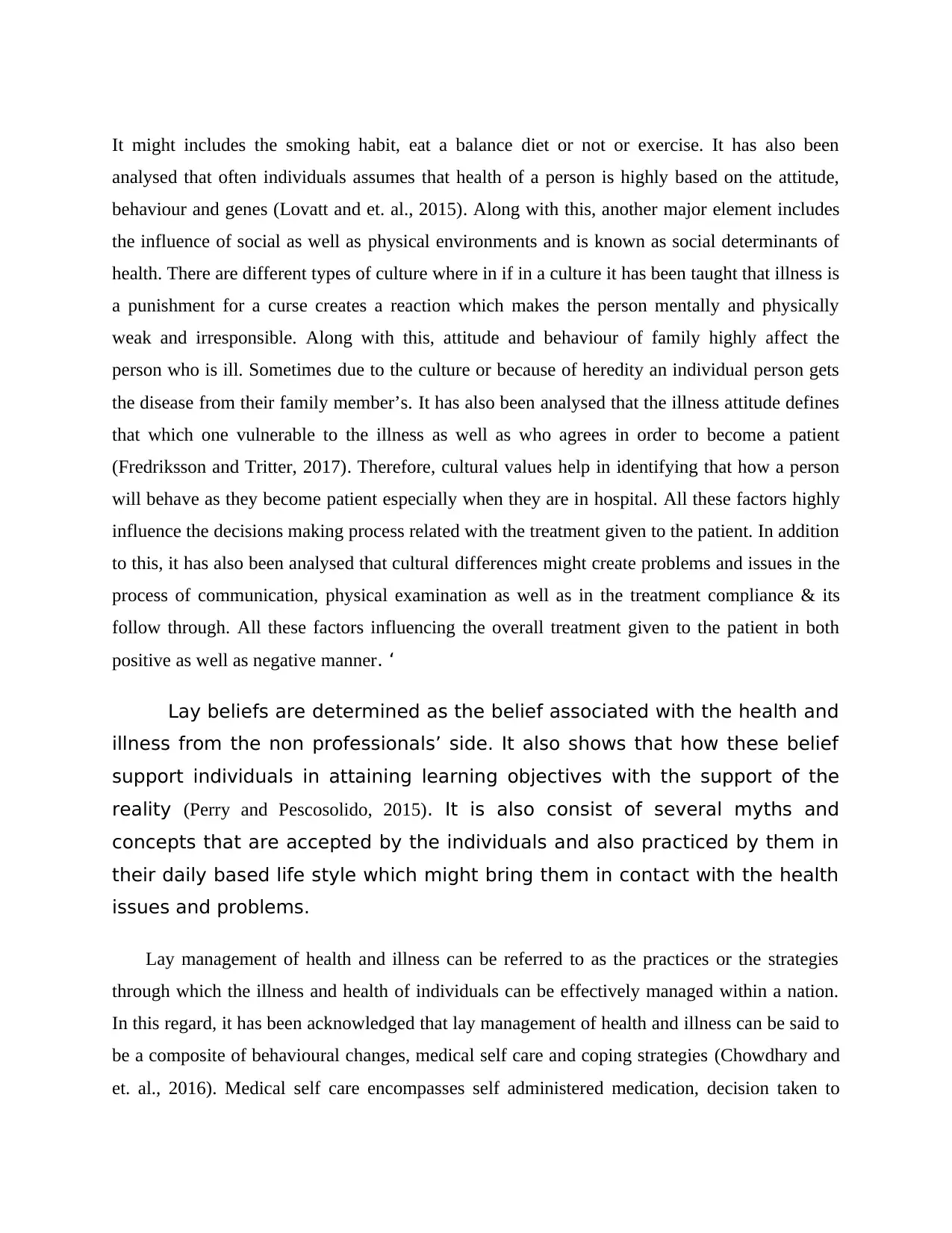
It might includes the smoking habit, eat a balance diet or not or exercise. It has also been
analysed that often individuals assumes that health of a person is highly based on the attitude,
behaviour and genes (Lovatt and et. al., 2015). Along with this, another major element includes
the influence of social as well as physical environments and is known as social determinants of
health. There are different types of culture where in if in a culture it has been taught that illness is
a punishment for a curse creates a reaction which makes the person mentally and physically
weak and irresponsible. Along with this, attitude and behaviour of family highly affect the
person who is ill. Sometimes due to the culture or because of heredity an individual person gets
the disease from their family member’s. It has also been analysed that the illness attitude defines
that which one vulnerable to the illness as well as who agrees in order to become a patient
(Fredriksson and Tritter, 2017). Therefore, cultural values help in identifying that how a person
will behave as they become patient especially when they are in hospital. All these factors highly
influence the decisions making process related with the treatment given to the patient. In addition
to this, it has also been analysed that cultural differences might create problems and issues in the
process of communication, physical examination as well as in the treatment compliance & its
follow through. All these factors influencing the overall treatment given to the patient in both
positive as well as negative manner. ‘
Lay beliefs are determined as the belief associated with the health and
illness from the non professionals’ side. It also shows that how these belief
support individuals in attaining learning objectives with the support of the
reality (Perry and Pescosolido, 2015). It is also consist of several myths and
concepts that are accepted by the individuals and also practiced by them in
their daily based life style which might bring them in contact with the health
issues and problems.
Lay management of health and illness can be referred to as the practices or the strategies
through which the illness and health of individuals can be effectively managed within a nation.
In this regard, it has been acknowledged that lay management of health and illness can be said to
be a composite of behavioural changes, medical self care and coping strategies (Chowdhary and
et. al., 2016). Medical self care encompasses self administered medication, decision taken to
analysed that often individuals assumes that health of a person is highly based on the attitude,
behaviour and genes (Lovatt and et. al., 2015). Along with this, another major element includes
the influence of social as well as physical environments and is known as social determinants of
health. There are different types of culture where in if in a culture it has been taught that illness is
a punishment for a curse creates a reaction which makes the person mentally and physically
weak and irresponsible. Along with this, attitude and behaviour of family highly affect the
person who is ill. Sometimes due to the culture or because of heredity an individual person gets
the disease from their family member’s. It has also been analysed that the illness attitude defines
that which one vulnerable to the illness as well as who agrees in order to become a patient
(Fredriksson and Tritter, 2017). Therefore, cultural values help in identifying that how a person
will behave as they become patient especially when they are in hospital. All these factors highly
influence the decisions making process related with the treatment given to the patient. In addition
to this, it has also been analysed that cultural differences might create problems and issues in the
process of communication, physical examination as well as in the treatment compliance & its
follow through. All these factors influencing the overall treatment given to the patient in both
positive as well as negative manner. ‘
Lay beliefs are determined as the belief associated with the health and
illness from the non professionals’ side. It also shows that how these belief
support individuals in attaining learning objectives with the support of the
reality (Perry and Pescosolido, 2015). It is also consist of several myths and
concepts that are accepted by the individuals and also practiced by them in
their daily based life style which might bring them in contact with the health
issues and problems.
Lay management of health and illness can be referred to as the practices or the strategies
through which the illness and health of individuals can be effectively managed within a nation.
In this regard, it has been acknowledged that lay management of health and illness can be said to
be a composite of behavioural changes, medical self care and coping strategies (Chowdhary and
et. al., 2016). Medical self care encompasses self administered medication, decision taken to
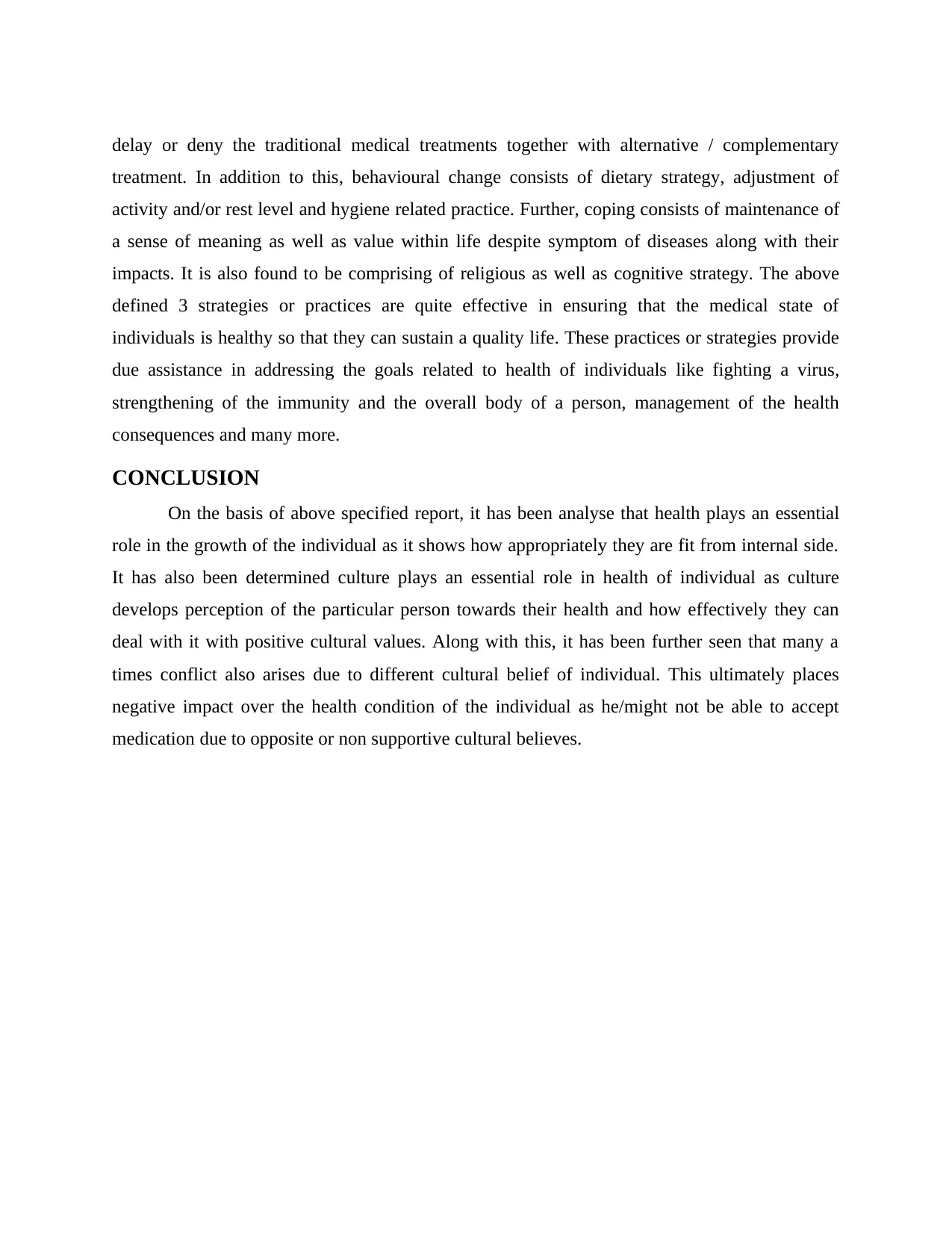
delay or deny the traditional medical treatments together with alternative / complementary
treatment. In addition to this, behavioural change consists of dietary strategy, adjustment of
activity and/or rest level and hygiene related practice. Further, coping consists of maintenance of
a sense of meaning as well as value within life despite symptom of diseases along with their
impacts. It is also found to be comprising of religious as well as cognitive strategy. The above
defined 3 strategies or practices are quite effective in ensuring that the medical state of
individuals is healthy so that they can sustain a quality life. These practices or strategies provide
due assistance in addressing the goals related to health of individuals like fighting a virus,
strengthening of the immunity and the overall body of a person, management of the health
consequences and many more.
CONCLUSION
On the basis of above specified report, it has been analyse that health plays an essential
role in the growth of the individual as it shows how appropriately they are fit from internal side.
It has also been determined culture plays an essential role in health of individual as culture
develops perception of the particular person towards their health and how effectively they can
deal with it with positive cultural values. Along with this, it has been further seen that many a
times conflict also arises due to different cultural belief of individual. This ultimately places
negative impact over the health condition of the individual as he/might not be able to accept
medication due to opposite or non supportive cultural believes.
treatment. In addition to this, behavioural change consists of dietary strategy, adjustment of
activity and/or rest level and hygiene related practice. Further, coping consists of maintenance of
a sense of meaning as well as value within life despite symptom of diseases along with their
impacts. It is also found to be comprising of religious as well as cognitive strategy. The above
defined 3 strategies or practices are quite effective in ensuring that the medical state of
individuals is healthy so that they can sustain a quality life. These practices or strategies provide
due assistance in addressing the goals related to health of individuals like fighting a virus,
strengthening of the immunity and the overall body of a person, management of the health
consequences and many more.
CONCLUSION
On the basis of above specified report, it has been analyse that health plays an essential
role in the growth of the individual as it shows how appropriately they are fit from internal side.
It has also been determined culture plays an essential role in health of individual as culture
develops perception of the particular person towards their health and how effectively they can
deal with it with positive cultural values. Along with this, it has been further seen that many a
times conflict also arises due to different cultural belief of individual. This ultimately places
negative impact over the health condition of the individual as he/might not be able to accept
medication due to opposite or non supportive cultural believes.
⊘ This is a preview!⊘
Do you want full access?
Subscribe today to unlock all pages.

Trusted by 1+ million students worldwide
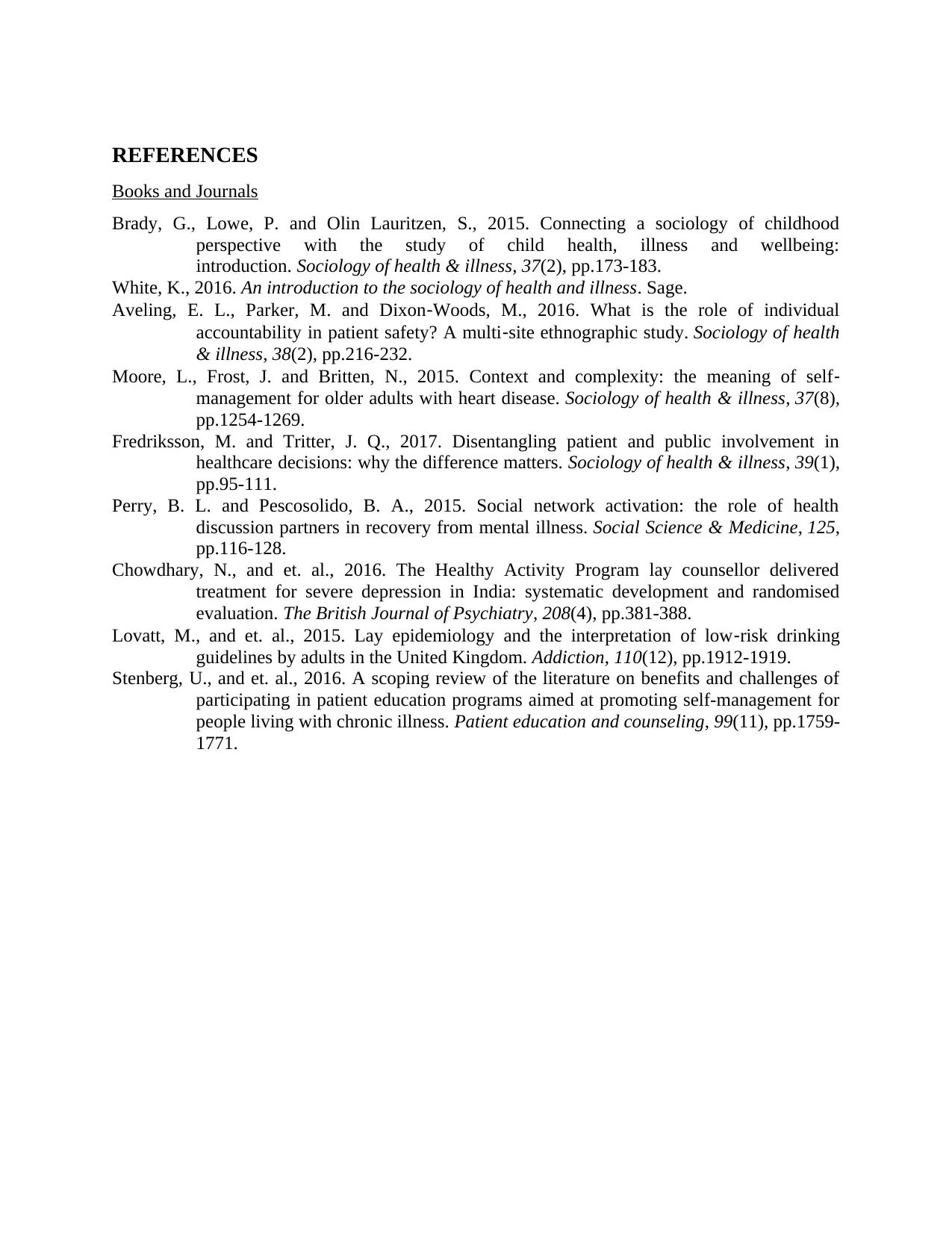
REFERENCES
Books and Journals
Brady, G., Lowe, P. and Olin Lauritzen, S., 2015. Connecting a sociology of childhood
perspective with the study of child health, illness and wellbeing:
introduction. Sociology of health & illness, 37(2), pp.173-183.
White, K., 2016. An introduction to the sociology of health and illness. Sage.
Aveling, E. L., Parker, M. and Dixon‐Woods, M., 2016. What is the role of individual
accountability in patient safety? A multi‐site ethnographic study. Sociology of health
& illness, 38(2), pp.216-232.
Moore, L., Frost, J. and Britten, N., 2015. Context and complexity: the meaning of self‐
management for older adults with heart disease. Sociology of health & illness, 37(8),
pp.1254-1269.
Fredriksson, M. and Tritter, J. Q., 2017. Disentangling patient and public involvement in
healthcare decisions: why the difference matters. Sociology of health & illness, 39(1),
pp.95-111.
Perry, B. L. and Pescosolido, B. A., 2015. Social network activation: the role of health
discussion partners in recovery from mental illness. Social Science & Medicine, 125,
pp.116-128.
Chowdhary, N., and et. al., 2016. The Healthy Activity Program lay counsellor delivered
treatment for severe depression in India: systematic development and randomised
evaluation. The British Journal of Psychiatry, 208(4), pp.381-388.
Lovatt, M., and et. al., 2015. Lay epidemiology and the interpretation of low‐risk drinking
guidelines by adults in the United Kingdom. Addiction, 110(12), pp.1912-1919.
Stenberg, U., and et. al., 2016. A scoping review of the literature on benefits and challenges of
participating in patient education programs aimed at promoting self-management for
people living with chronic illness. Patient education and counseling, 99(11), pp.1759-
1771.
Books and Journals
Brady, G., Lowe, P. and Olin Lauritzen, S., 2015. Connecting a sociology of childhood
perspective with the study of child health, illness and wellbeing:
introduction. Sociology of health & illness, 37(2), pp.173-183.
White, K., 2016. An introduction to the sociology of health and illness. Sage.
Aveling, E. L., Parker, M. and Dixon‐Woods, M., 2016. What is the role of individual
accountability in patient safety? A multi‐site ethnographic study. Sociology of health
& illness, 38(2), pp.216-232.
Moore, L., Frost, J. and Britten, N., 2015. Context and complexity: the meaning of self‐
management for older adults with heart disease. Sociology of health & illness, 37(8),
pp.1254-1269.
Fredriksson, M. and Tritter, J. Q., 2017. Disentangling patient and public involvement in
healthcare decisions: why the difference matters. Sociology of health & illness, 39(1),
pp.95-111.
Perry, B. L. and Pescosolido, B. A., 2015. Social network activation: the role of health
discussion partners in recovery from mental illness. Social Science & Medicine, 125,
pp.116-128.
Chowdhary, N., and et. al., 2016. The Healthy Activity Program lay counsellor delivered
treatment for severe depression in India: systematic development and randomised
evaluation. The British Journal of Psychiatry, 208(4), pp.381-388.
Lovatt, M., and et. al., 2015. Lay epidemiology and the interpretation of low‐risk drinking
guidelines by adults in the United Kingdom. Addiction, 110(12), pp.1912-1919.
Stenberg, U., and et. al., 2016. A scoping review of the literature on benefits and challenges of
participating in patient education programs aimed at promoting self-management for
people living with chronic illness. Patient education and counseling, 99(11), pp.1759-
1771.
1 out of 7
Related Documents
Your All-in-One AI-Powered Toolkit for Academic Success.
+13062052269
info@desklib.com
Available 24*7 on WhatsApp / Email
![[object Object]](/_next/static/media/star-bottom.7253800d.svg)
Unlock your academic potential
Copyright © 2020–2026 A2Z Services. All Rights Reserved. Developed and managed by ZUCOL.




